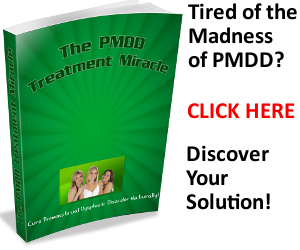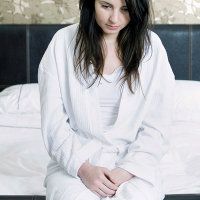Premenstrual Symptoms: A Bane Of Every Woman
When it is one of those days when you feel bloated, have breast pain, gain weight, have acne, headaches, cramping and mood swings, you know it is one of those days that every woman dreads.
A lot of women suffer from premenstrual symptoms (PMS) and it can cause a lot of inconvenience to the sufferer. There are a plenty of home-based treatments available for the PMS sufferers but it needs some experimentation to determine the right one for you.
The common treatments for PMS are:
- Reduce your intake of saturated fats: When you consume a lot of fatty foods, your PMS symptoms and pain tend to worsen. Avoid fatty cuts of beef, lamb and pork and go in for fish and poultry. Replace butter, which has high content of saturated fats with flaxseeds, safflower and corn, which are rich in polyunsaturated fats.
- Minimize salt intake: Excessive intake of salt leads to water retention. Many snack foods and some fast-foods have very high salt content. These foods will lead to bloating. Hence it is advisable to choose fresh fruits and vegetables over packaged and processed foods.
- Take more of carbohydrates to minimize the cravings: It is common to crave for high carbohydrate foods like ice cream, chocolate and potato chips during PMS. But switching to complex carbohydrates like whole grains, pasta, cereal and bagel will effectively counter the food cravings experienced during PMS. Also, these foods are the excellent sources of fiber and thus remove the excess estrogen from the body. High-carbohydrate, low-sugar foods help in relieving the psychological symptoms of tension, anxiety and mood swings associated with PMS. Women who eat high-fiber foods are more alert and happier than those who don’t.
- Move your body: Exercise has been shown to reduce many physical and psychological symptoms associated with PMS. This is because exercise releases endorphins, the chemicals in the brain associated with easing pain and increasing the sense of well-being. It also reduces breast tenderness, food cravings, fluid retention and depression.
- Eliminate caffeine: If you are sensitive to caffeine, it is best to avoid caffeine like tea, coffee, colas and chocolates. Studies have proved that women who consume two or more cups of caffeine a day are likely to suffer from PMS, since caffeine is a stimulant and can lead to anxiety and irritability. It also leads to breast tenderness.
- Read labels on pain relievers: Some over-the-counter medicines contain caffeine. Hence, if you take them during PMS, they will aggravate the symptoms. Read the contents of the medicine carefully before taking them.
- Skip alcohol: Alcohol is a depressant and a diuretic and can worsen PMS headaches and fatigue. It can increase depression. Hence, avoid taking any alcoholic beverages including wine or beer, if you have PMS.
- Prevent menstrual acne with vitamins A and D: Vitamins A and D have been proved to suppress menstrual acne. Eat plenty of carrots, cooked spinach, cooked sweet potatoes and cantaloupe for vitamin A and plenty of sunshine or fortified milk for vitamin D.
- Improve your mood with vitamin B6: Taking more of vitamin B6 has been shown to improve mood swings, fluid retention, breast tenderness, bloating, sugar craving and fatigue. You can take supplements of 25 to 100 milligrams a day or increase your intake of vitamin B6 by eating more of potatoes, bananas, fish, white meat in chicken and turkey.
- Reduce stress and allergies by taking vitamin C: Vitamin C helps in alleviating the stress experienced during PMS. Being a natural antihistamine, it helps women whose allergies worsen during PMS. Take more of vegetables like broccoli, Brussels sprouts and raw peppers and fruits like cantaloupe, grapefruit, oranges, cranberry and citrus fruits.
- Vitamin E helps: Vitamin E has been shown to have a powerful effect on the hormonal system, thus relieving painful breast symptoms, anxiety and depression. Cooking oils and salad dressings like olive oil, safflower oil and corn oil as well as some fruits like blackberries and apples contain vitamin E.
- Fight PMS with calcium and magnesium: Calcium prevents menstrual cramps and pain. Magnesium helps the body in absorbing calcium. Magnesium helps in controlling premenstrual food cravings and stabilizing moods. If you do not suffer from lactose intolerance, you can opt for skim milk as a source of calcium. Include green leafy vegetables, beans, peas, tofu and canned salmon for calcium and spinach, tofu, rice bran and some fish like halibut and mackerel for magnesium.



